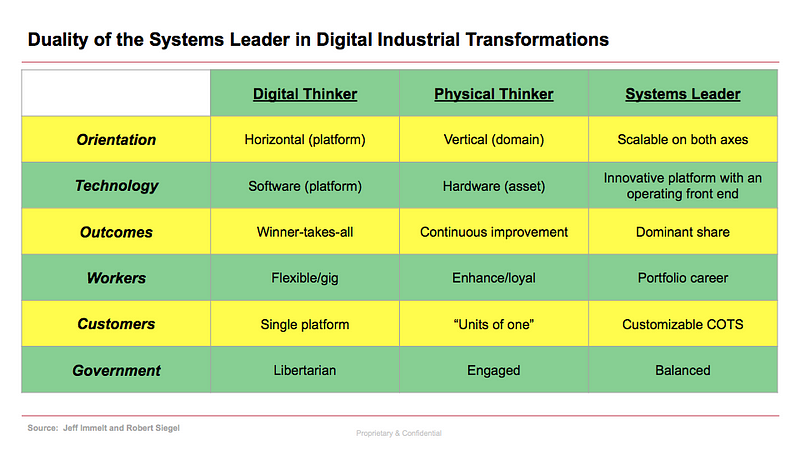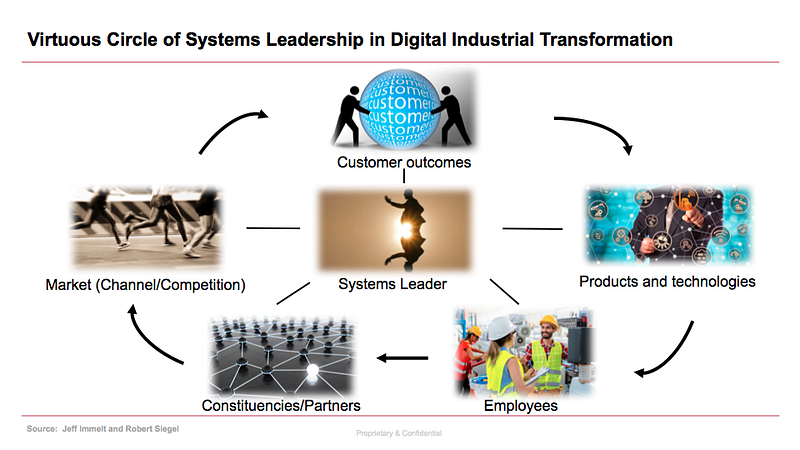This article was written by XSeed Capital Partner, Robert Siegel and former Chairman and CEO of GE, Jeff Immelt. It originally appeared on Medium.
Much has been written about the frame-breaking changes taking place in industrial markets driven by the combination of hardware and software products newly available to customers. From mobility to manufacturing to healthcare, the nature of these new solutions is fundamentally different than what was available over previous decades.
How these products and services are developed, and how companies need to change their organizational structures and behaviors to meet the needs of customers, has been thrust into the forefront of the media, boardrooms and organizations all over the world. Whether exploring The Industrialist’s Dilemma or the challenges of Industry 4.0, companies, academics and individuals have awoken to the needs of a changing world, the new and differing bases of competitive advantage, and the set of corporate competencies that need to evolve and intensify in order to thrive in the future.
However, one major constituent in this process has been largely ignored and remains unexplored — the skills and competencies required of the leaders of these companies has not been systematically examined in depth for this changing world order. Whether executives of these companies come from industrial incumbents or digital upstarts, we suggest that the next generation of executives must employ a new set of skills and talents that their predecessors neither had nor required. In short, we believe the next generation of management must think, act and behave as systems leaders for their companies to achieve success in the digital industrial transformation.
Let us define systems thinking in the business context and why it is important. Systems thinking is to understand thoroughly how customer success is optimized by knowing how all the elements of an organization work with both internal and external constituents. This is in contrast to relying on individual parts of a company attempting to optimize value without first considering how each combine to deliver solutions to customers. It is not typically “taught” because it is essentially interdisciplinary. Yet, the collision between physical and digital worlds requires systems thinking. How will electronic medical records help keep patients healthy? How will a digital movement planner improve a railroad’s velocity? How can big data improve an airline’s profitability? These are the jobs of systems thinkers.
We refer to this competency as the “duality of the systems leader.” Systems leaders need to simultaneously master those attributes that have historically made digital and physical leaders successful separately, and now require leadership to create and build teams that are able to excel on both vectors of digital and physical excellence.
 Whereas previously digital thinkers were focused largely on building platforms and driving toward a winner-take-all mindset, leaders who come from a traditionally digital DNA now need to understand the implications of making and selling physical as well as digital goods. How one manufactures, services and works with customer expectations in a world of physical assets is fundamentally different than delivering only a software offering. Similarly, physical thinkers need to understand that productivity improvements in operations will not lead to disproportionate growth and a defendable market position going forward.
Whereas previously digital thinkers were focused largely on building platforms and driving toward a winner-take-all mindset, leaders who come from a traditionally digital DNA now need to understand the implications of making and selling physical as well as digital goods. How one manufactures, services and works with customer expectations in a world of physical assets is fundamentally different than delivering only a software offering. Similarly, physical thinkers need to understand that productivity improvements in operations will not lead to disproportionate growth and a defendable market position going forward.
Digital leaders need to make other adjustments, such as changing their mindsets and attitudes toward governments from a libertarian perspective that sees government interaction as inhibiting innovation, to one where the size and scope of their businesses will, by design, be in markets that invite government engagement and regulation. Similarly, physical leaders need to be able to compete not only with government commitment and protection, but also by delivering goods and services with a speed and competency that win over customers with the best product possible — not solutions that are simply protected by government fiat.
Systems leaders must master the successful attributes of both digital and physical and fuse them together. They must master horizontal (platforms) and vertical (industry domain). There is a reason why no horizontal company has yet won in healthcare: they haven’t mastered the area. Systems leaders must surmount large and small; speed with scale. Most industrial companies have outsourced IT because they haven’t mastered a software culture. This has reduced their value. Systems leaders must take risk on customer outcomes. This is more than a new leadership buzzword. It is a mindset that will become the standard going forward.
We suggest that a systems leader who truly understands how to blend these attributes has the potential to create significant competitive advantage for his/her company in the new digital industrial landscape. Systems leaders who focus on the interactions of a company’s products and services on a customer’s business (with an outcome-focused mindset) will have disproportionate insights on the value their companies bring to a market. Starting with an understanding of a customer’s financial benefits when purchasing a set of goods or services allows systems leaders to have a perspective that grasps the core foundation of that solutions that deliver the best results. In turn, this knowledge enables systems leaders to have insight on what types of people to hire inside of the organization, with whom to partner outside of the company, how to effectively manage one’s channel, and when to engage with outside entities such as governments. All of this allows a holistic view of customer success and to ability to re-focus on customer outcomes. Systems leaders act as the gravitational center of these activities, finding the resources, strategies and actions that lead to a positively reinforcing virtuous circle for their companies.

Uber is a fusion company. The horizontal digital platform for ride sharing is formidable. But, it is the operational, cultural and global aspects of Uber that will determine its success as a business. This may indicate the future evolution of valuable tech companies. They will evolve from software point-solutions to platforms to operating companies. Only systems leaders can manage this transformation.
Similarly, industrial companies like GE, BNSF and FedEx will have to become tech companies. Only through analytics can BNSF meaningfully improve its productivity. Only through analytics can FedEx protect its lead in logistics. Only through analytics can Kaiser Permanente go “risk on in healthcare.” Fred Smith is a digital leader. Dara Khosrowshahi is a physical one.
Most importantly, this leadership takes courage. It requires a commitment to change, almost always with the outcome unknown. In established companies where a leader is often answering to public market investors and key decisions are analyzed repeatedly in the press, the natural human reaction is to take a safe and conservative path in order to minimize unpredictability. But failure to take the needed actions required by a system leader will lead to an almost certain decline. And while driving this transformation does not guarantee success, it is the only possible path to thriving in an uncertain future.
This Spring the two of us will be co-teaching a course at the Stanford Graduate School of Business on Systems Leadership for the Digital Industrial Transformation. In this class we will be studying best practices of leaders from both upstarts and incumbents that are effectively blending the attributes of both digital and physical. We will drill down into what skills, behaviors and competencies are required to lead organizations that must fuse the capabilities and skills of both the digital and physical worlds to deliver better results for customers, employees and partners. We look forward to sharing our insights and learnings, engaging on our key findings, and telling a few stories, through which we hope to open the next chapter of business leadership.
Jeff Immelt is the former Chairman and CEO of GE, and Robert Siegel is a Lecturer in Management at the Stanford University Graduate School of Business and a Partner at XSeed Capital.
